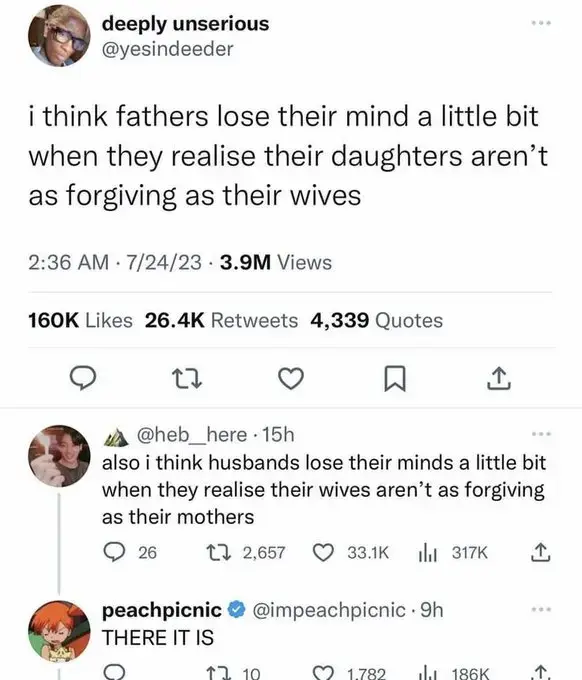this post was submitted on 16 Sep 2024
586 points (83.4% liked)
Microblog Memes
6636 readers
2595 users here now
A place to share screenshots of Microblog posts, whether from Mastodon, tumblr, ~~Twitter~~ X, KBin, Threads or elsewhere.
Created as an evolution of White People Twitter and other tweet-capture subreddits.
Rules:
- Please put at least one word relevant to the post in the post title.
- Be nice.
- No advertising, brand promotion or guerilla marketing.
- Posters are encouraged to link to the toot or tweet etc in the description of posts.
Related communities:
founded 2 years ago
MODERATORS
you are viewing a single comment's thread
view the rest of the comments
view the rest of the comments

Hmmm.
I'd phrase it differently. Unrealistic expectations of the opposite sex [^1] exist by both sexes, but that there outcomes for women when the stereotypes of men hold true are often more dangerous. One is saying it isn't sexist; the other is saying that there's a vast difference in risk. This becomes one of those tautological arguments where women can't be sexist because sexism is redefined to mean "it can only be sexist if it's men doing it."
The "Would you rather a bear or..." question could be reused in a very uncomfortable way. You could swap men with a group of yoing, black, inner city men and rural white men for women. But instead of demonstrating that men are the issue and women the victims, suddenly it'd be black men who are the victims and rural white men the problem. And, yet, the fear and the risk of confirmation of stereotypes is the same - only in this case, believing those stereotypes makes people racist.
These sorts of tautologies - only whites can be racist, only men can be sexist - is sloppy, lazy, and dangerous, because it prevents introspection and always externalizes blame. I'm not saying that you are arguing a tautology, but that's the essence of this thread: minimizing sexism against men in the basis that it can't be sexism if rape isn't involved. Which is exactly how this thread went, isn't it?
I want to reiterate that I agree that there's a false equivalency; consequences for women can be higher. My argument is that it doesn't make it not sexism to broadly brush all men with a demeaning funny little tweet.
Also: there should be a Godwin's Law for rape. The conversation was about household stereotypes. That was a bit of a leap.
I'll leave this here.
https://www.who.int/news/item/09-03-2021-devastatingly-pervasive-1-in-3-women-globally-experience-violence
In the US it's 1 in 6 women (and 1 und 33 men).
https://rainn.org/statistics/victims-sexual-violence
And last but bit least:
https://www.humboldt.edu/supporting-survivors/educational-resources/statistics
So no, jumping to rape is not a leap. The fear of sexual violence is part of beeing a women. I don't know a single women that wasn't in a situation that did or did almost resulted in sexual violence.
It's not part of beeing a men. I have never in my life feared about sexual violence and I share that with the vast majority of men.
I'm surprised it's dropped. The statistic used to be 1 in 4.
Yeah, it is. The conversation was about gender roles, until you brought in rape.
Was it tough?
Then rape isn't part of the risk you were talking about here?
Fear of rape, among others. Which I wanted to show is backed by the data.
lesser pain vs worse pain doesn't mean that lesser pain is inexistent